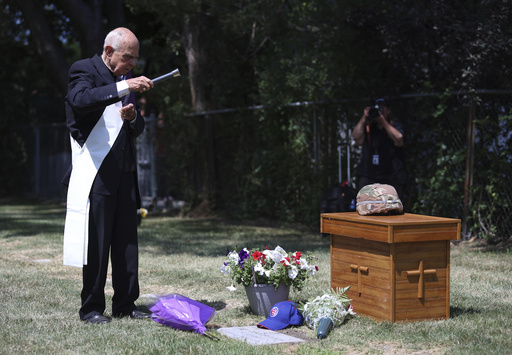CHICAGO — Near the gravestone of a relative he never knew, Mark Bailey held a neatly folded American flag offered by an Army officer. As he clutched it tightly, he felt a wave of closure and connection with his long-lost relative, Reba Caroline Bailey, who had been estranged and missing for decades before dying in 2015 as an unidentified ward of the state.
“I want Reba to know we’re part of the family circle,” Mark expressed. This week, he attended an uncommon funeral service in Illinois that honored Reba, a veteran of the Women’s Army Corps, whose severe memory issues led to dying under an alias. The service was made possible by an exceptional cold case investigation that posthumously identified the 75-year-old.
Detectives unveiled the perplexing story of how the veteran, who went by the name Seven and lived in Chicago, ended up homeless and devoid of memories from their own past. “I never knew I had this family member,” said Mark’s 19-year-old son, Cole, who traveled from central Illinois for the occasion. “Knowing there’s someone found and no longer lost provides solace.”
Following the investigation, a simple cement cylinder marking the unidentified grave was substituted with a rectangular plaque inscribed with “Reba Caroline Bailey, PFC US Army,” complete with a cross.
The Seven Doe cold case began in 2023 when Cook County Sheriff Tom Dart’s office took over the newborn. The body belonged to an individual who died of natural causes at an assisted living facility. As a ward of the state without memory of a legal name or family, the death was attributed to heart disease, further complicated by diabetes and dementia. The body was laid to rest in a section for unclaimed people at Mount Olivet Catholic Cemetery in Chicago, marked anonymously as the 4,985th case of the year.
In 2023, investigators matched postmortem fingerprints to a 1961 Army document from a veteran originating from Danville, about 140 miles south of Chicago. Despite failing to locate immediate relatives—given that five siblings and an ex-husband had passed away—detectives initiated a search.
For those relatives found, the investigation confirmed hearsay of a family member who had vanished. Following the identification, detectives arranged for a new headstone with the Army records’ name and installed it discreetly last year.
Jason Moran, leading the sheriff’s missing persons unit, expressed fulfillment in securing a military-honored funeral for the veteran. “It’s a privilege to aid families in closing narratives,” he remarked, acknowledging his recognition for resolving other notable cold cases.
Generational tales in the Bailey family speculated on their long-lost relative’s mysterious life post-military service. Stories abounded regarding potential offspring or questions surrounding the relative’s gender identity, with some surmising a family dispute’s origins spanning decisions from enlisting in the military to sexual orientation.
Attempts to find the relative over time were made, notably by great-niece Amanda Ingram, who meticulously built a family tree with Census data and photographs. “It’s astonishing how someone can just vanish with no trace,” said Ingram. “We may never know all the details.”
In late 1970s Chicago, an individual donned in a military jacket and aviator cap sought shelter at St. Francis Catholic Worker House, where they asked to be called Seven and self-identified as male. Seven quickly became the establishment’s cook, drawing crowds attracted by the meals.
The cause behind Seven’s memory lapse remains shrouded in mystery. Theories range from brain trauma from a 1950 car crash that claimed Bailey’s mother’s life to military service, including time served at both Fort Ord in California and Fort McClellan in Alabama, known for potential toxin exposures.
Neither family, detectives, nor residents of the worker house ever deciphered the significance of the name Seven. Ingram, unable to attend this week, tasked local Daughters of the American Revolution members with attending in her place. She reflected, “Those who visit the cemetery will now know who she was,” integrating the findings into her detailed family narratives.
Mark Bailey and his son brought items to the service to honor their relative’s dual life, settling on a blue Cubs cap instead of a jersey due to difficulties in finding a specific piece.
The Tuesday ceremony unfolded with prayers, a 21-gun salute, and the solemn sound of taps played by a bugler, all traditional in military memorials. Cook County sheriff’s detectives and committee members from the Archdiocese of Chicago participated.
Mark Bailey addressed those gathered, expressing a wish for other unidentified graves to achieve the same recognition. Sheriff Dart acknowledged being nearly speechless after the event, asserting that the Illinois veteran merited military honors alongside the presidential flag “rather than being forgotten as an anonymous number.”
Relatives plan to eventually display the flag at the Potomac American Legion, keeping the Bailey legacy alive. Mark Bailey noted the significance of recognizing military service within the largely veteran family, hoping the memory leaves a lasting impression on his son, who is contemplating enlistment.
“For my son, it’s a forever keepsake,” he concluded.


